Citroen Spacetourer vs VW ID. Buzz Cargo – Differences & prices compared
Compare performance, boot space, consumption and price in one view.
Find out now: which car is the better choice for you – Citroen Spacetourer or VW ID. Buzz Cargo?
The Citroen Spacetourer (Bus) comes with a Electric or Diesel engine and Automatic transmission. In comparison, the VW ID. Buzz Cargo (Cargo Van) features a Electric engine with Automatic transmission.
When it comes to boot capacity, the Citroen Spacetourer offers 2011 L, while the VW ID. Buzz Cargo provides – depending on how much space you need. If you’re looking for more power, decide whether the 177 HP of the Citroen Spacetourer or the 340 HP of the VW ID. Buzz Cargo suits your needs better.
In terms of consumption, the values are 24.30 kWh7.30 L per 100 km for the Citroen Spacetourer, and 19.20 kWh for the VW ID. Buzz Cargo.
Price-wise, the Citroen Spacetourer starts at 33100 £, while the VW ID. Buzz Cargo is available from 43600 £. Compare all the details and find out which model fits your lifestyle best!
Citroen Spacetourer
The Spacetourer redefines versatility with its spacious interior and comfortable seating for families and groups. Its stylish exterior and thoughtful design features make it not just a practical choice, but an attractive one for modern drivers. Whether for daily commutes or adventurous road trips, the Spacetourer seamlessly blends functionality and flair.
details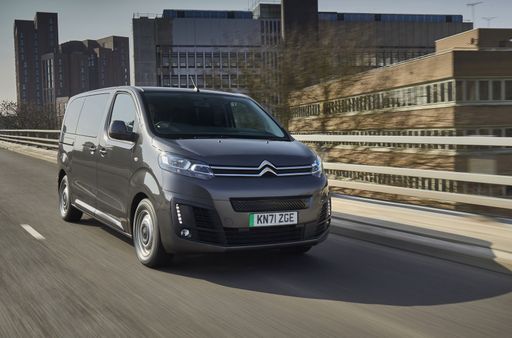 @ media.stellantis.com
@ media.stellantis.com
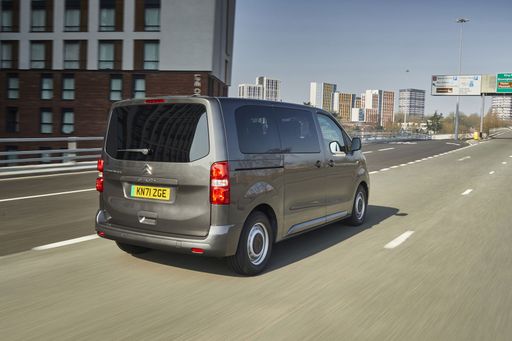 @ media.stellantis.com
@ media.stellantis.com
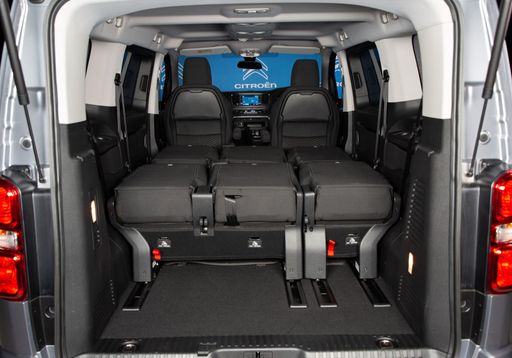 @ media.stellantis.com
@ media.stellantis.com
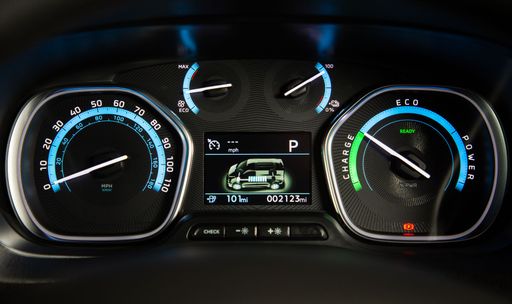 @ media.stellantis.com
@ media.stellantis.com
VW ID. Buzz Cargo
The VW ID. Buzz Transporter represents a bold leap into the future with its innovative electric design and retro-inspired aesthetic. Combining practicality with modern technology, it offers a spacious interior and advanced connectivity features ideal for both urban and long-distance journeys. This vehicle stands as a testament to Volkswagen's commitment to sustainability and forward-thinking mobility solutions.
details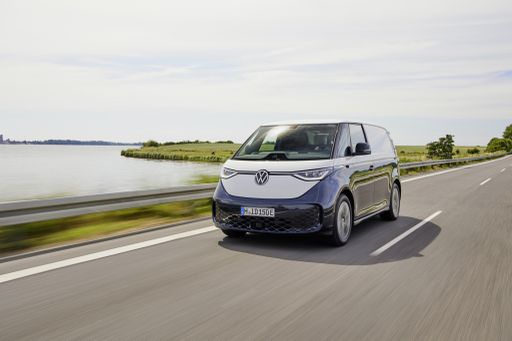 @ volkswagen-newsroom.com
@ volkswagen-newsroom.com
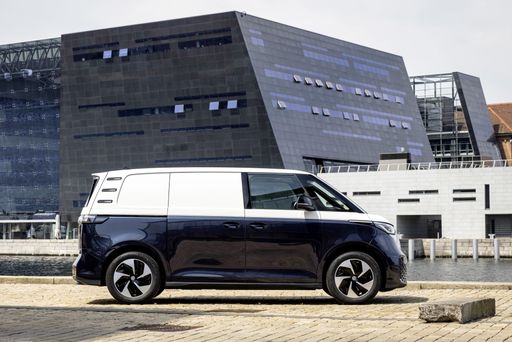 @ volkswagen-newsroom.com
@ volkswagen-newsroom.com
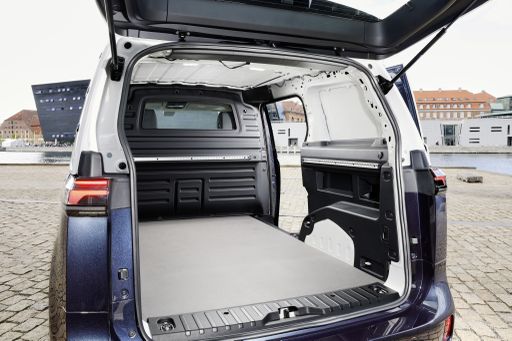 @ volkswagen-newsroom.com
@ volkswagen-newsroom.com

|

|
|
|
|
Costs and Consumption |
|
|---|---|
|
Price
33100 - 52100 £
|
Price
43600 - 51400 £
|
|
Consumption L/100km
7.3 - 7.4 L
|
Consumption L/100km
-
|
|
Consumption kWh/100km
24.3 - 24.9 kWh
|
Consumption kWh/100km
19.2 - 20.3 kWh
|
|
Electric Range
217 - 351 km
|
Electric Range
330 - 455 km
|
|
Battery Capacity
-
|
Battery Capacity
59 - 79 kWh
|
|
co2
0 - 194 g/km
|
co2
0 g/km
|
|
Fuel tank capacity
70 L
|
Fuel tank capacity
-
|
Dimensions and Body |
|
|---|---|
|
Body Type
Bus
|
Body Type
Cargo Van
|
|
Seats
8 - 9
|
Seats
3
|
|
Doors
5
|
Doors
4
|
|
Curb weight
1953 - 2240 kg
|
Curb weight
2264 - 2510 kg
|
|
Trunk capacity
1624 - 2011 L
|
Trunk capacity
-
|
|
Length
4983 - 5333 mm
|
Length
4712 mm
|
|
Width
1920 mm
|
Width
1985 mm
|
|
Height
1890 mm
|
Height
1932 mm
|
|
Payload
850 - 914 kg
|
Payload
640 - 753 kg
|
Engine and Performance |
|
|---|---|
|
Engine Type
Electric, Diesel
|
Engine Type
Electric
|
|
Transmission
Automatic
|
Transmission
Automatic
|
|
Transmission Detail
Automatikgetriebe
|
Transmission Detail
-
|
|
Drive Type
Front-Wheel Drive
|
Drive Type
Rear-Wheel Drive, All-Wheel Drive
|
|
Power HP
136 - 177 HP
|
Power HP
170 - 340 HP
|
|
Acceleration 0-100km/h
10.6 - 12.1 s
|
Acceleration 0-100km/h
-
|
|
Max Speed
130 - 185 km/h
|
Max Speed
145 - 160 km/h
|
|
Torque
260 - 400 Nm
|
Torque
310 - 679 Nm
|
|
Number of Cylinders
4
|
Number of Cylinders
-
|
|
Power kW
100 - 130 kW
|
Power kW
125 - 250 kW
|
|
Engine capacity
1997 cm3
|
Engine capacity
-
|
General |
|
|---|---|
|
Model Year
2024
|
Model Year
2024
|
|
CO2 Efficiency Class
A, G
|
CO2 Efficiency Class
A
|
|
Brand
Citroen
|
Brand
VW
|
Citroen Spacetourer
Meet the Citroën Spacetourer: A Versatile Electric Option for Modern Families
The automotive world has seen a remarkable shift towards sustainability, and the Citroën Spacetourer stands out as a prime example of this evolution. With its compelling design and impressive electric capabilities, the Spacetourer addresses the needs of large families, businesses, and adventure seekers alike.
Innovative Electric Powertrain
The Spacetourer line features a robust electric powertrain that is designed to offer both efficiency and performance. Available in multiple configurations, including the e-Spacetourer M and XL versions, customers have the flexibility to choose between battery sizes of 50 kWh and 75 kWh. The electric motor delivers a consistent output of 136 horsepower, ensuring a smooth driving experience with a torque of 260 Nm.
Moreover, the Spacetourer is engineered for efficiency, boasting a consumption rating as low as 24.3 kWh/100km, depending on the variant. This efficiency translates to an electric range of up to 351 km on a single charge, making it an ideal companion for both daily commutes and long-distance travels.
Practicality Meets Comfort
The design of the Citroën Spacetourer is inherently practical. Available in configurations for 8 to 9 seats, it can comfortably accommodate larger groups without compromising individual space. The interior is thoughtfully designed, providing ample headroom and legroom for all passengers. With a trunk capacity ranging from 1624 liters to an impressive 2011 liters, the model ensures that you won’t have to leave anything behind on your journeys.
In addition to passenger comfort, the Spacetourer features a maximum payload capacity of up to 914 kg, allowing it to handle heavier loads with ease. This makes it perfect for business use or family trips where luggage and equipment are often in tow.
Safety and Driving Innovations
The Citroën Spacetourer is not just about space and efficiency; it also prioritizes safety and technology. Equipped with advanced safety features, the vehicle ensures peace of mind for every journey. From automatic emergency braking systems to lane departure warnings, the Spacetourer incorporates the latest in automotive safety technology to keep its occupants secure.
Additionally, the Spacetourer integrates modern connectivity features. A user-friendly infotainment system, compatible with both Android and Apple devices, allows drivers and passengers to stay connected while on the go. With options for Bluetooth connectivity and navigation, long trips can feel less tedious and more enjoyable.
Environmentally Friendly Choice
With zero CO2 emissions, the Spacetourer proudly fits into the A efficiency class for CO2 ratings. As cities worldwide become increasingly stringent on emissions, an electric vehicle like the Spacetourer is an efficient choice for both local and urban driving. The ease of charging, combined with the van's long range, addresses the common concerns associated with electric vehicles, making it a pragmatic option for environmentally conscious consumers.
The Verdict: Is the Citroën Spacetourer Right for You?
Considering its blend of space, comfort, and advanced electric technology, the Citroën Spacetourer is an attractive proposition for families and businesses alike. As electric-powered vehicles continue to dominate discussions in the automotive industry, the Spacetourer takes a commendable step forward, offering an impressive balance of practicality and innovation. Whether you're running errands, planning a road trip, or managing a small business, the Spacetourer rises to meet every demand with style and sustainability.
VW ID. Buzz Cargo
Reimagining the Classic: The VW ID. Buzz Transporter
The automotive industry has recently been inundated with a range of electric vehicles (EVs), but few can claim a lineage as iconic as the Volkswagen ID. Buzz Cargo. A modern-day reimagining of the classic VW Microbus, the ID. Buzz Transporter seamlessly blends nostalgia with cutting-edge technology and sustainable performance.
Power Meets Precision: Performance and Efficiency
Available in multiple configurations, the ID. Buzz Transporter offers both rear-wheel drive and all-wheel drive options. The base model features an impressive 286 horsepower and a respectable electric range of 461 km, thanks to its 19.2 kWh consumption per 100 km. For those who crave more power, the all-wheel-drive model ups the ante with a thrilling 340 horsepower and a range of 432 km, facilitated by its slightly higher 20.3 kWh/100 km consumption.
Both versions rely on an efficient reduction gearbox, ensuring a smooth and automatic driving experience. The rear-wheel-drive's entry-level model provides a more accessible point for EV enthusiasts with 170 horsepower and an overall easier handling package.
The Heart of an Electric Revolution: Battery and Range
Power comes from robust battery configurations that reflect VW's commitment to sustainable performance. The ID. Buzz Transporter boasts a 79 kWh battery in its higher-end models, allowing expansive commutes or work-related travels. Meanwhile, the 59 kWh option offers a reduced footprint, without substantially compromising on performance, to align perfectly with its more entry-level 170 HP variant.
Functional Innovation: Design and Practicality
While the exterior design pays homage to its retro predecessor, the four-door ID. Buzz is all about embracing modern interior design. The cargo van accommodates up to three seats, making it not only a style statement but a practical choice for businesses needing a workhorse with a zero-emission output.
Weighing in at a curb weight range from 2264 kg to 2510 kg, depending on the model chosen, the vehicle is a testament to Volkswagen's focus on durability and reliability. Despite its weight, the ID. Buzz delivers a payload ranging from 640 kg to 753 kg, maintaining crucial cargo efficiency.
Sustainability Meets Technology: Features and Future Outlook
Volkswagen intentionally integrated forward-thinking technology into the ID. Buzz, emphasizing zero emissions with a CO2 rating of 0 g/km and maintaining an A-grade CO2 efficiency class. These advancements, paired with a maximum speed of 160 km/h and an impressive torque (ranging from 310 Nm to 679 Nm based on the selected variant), set a new standard for electric utility vehicles.
Conclusion: A Symbol of Tomorrow, Today
The ID. Buzz Transporter signifies VW's earnest step into the future while paying homage to its rich heritage. Priced between €50,825 and €59,922, the vehicle caters to a range of consumers looking for a versatile and eco-friendly solution without sacrificing quality or style. With its innovative engineering and nostalgic charm, the ID. Buzz Transporter is poised to capture the imagination of both traditional VW fans and new EV adopters in 2024.
The prices and data displayed are estimates based on German list prices and may vary by country. This information is not legally binding.
